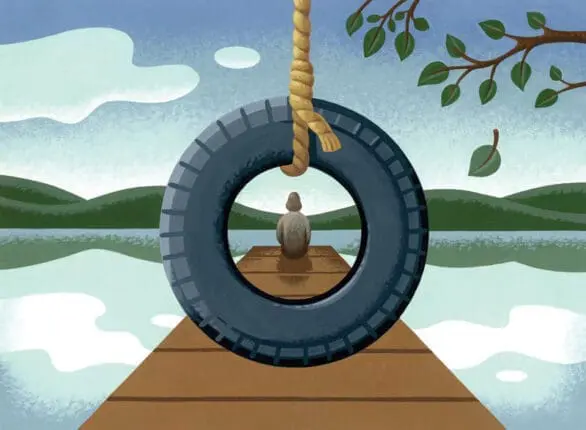We didn’t meet our new neighbors at the lake until Labor Day weekend. Standing next to a blazing bonfire he’d built in a steel drum, Walter beckoned us over and introduced himself. His large belly, constantly moving eyes, and untrimmed, iron-gray goatee gave him a grizzled look—a little like a retired fire chief, and a little like a wild bear. He chewed on a toothpick as he tossed pieces of cardboard into the fire.
“I’ve waited my whole life for this view,” he said, indicating not just his shoreline but his yard, much larger than ours and studded with century-old pine trees, which we’d come to love over the years. Liz and Martin, who’d owned the cottage previously for 40 years, had let us use their dock and beach. Because they spent so little time there, we’d mentally annexed the property, turning our small sliver of land into a compound.
“You have a nice little yard, too,” he added, surveying our property, his toothpick migrating to the other side of his mouth. “But you gotta get rid of that tire swing.”
My husband David explained that our boys, now men, had spent hours leaning over that cheap plastic donut, now mended with duct tape and attached by a fraying rope to a tree just outside the kitchen window.
“My grandkids are gonna be swarming all over the place around here,” Walter said. “And we’ll be here year round. I’m adding a foundation, raising the house. When you come back next year, it’ll all be different. Them trees, they’ll be gone.”
David picked up his guitar and went out on the deck to play, his way of digesting the conversation with Walter. I went down to the dock where I simply sat by the water, as I often did, hoping the scenery would indelibly imprint itself inside me so that later, when I undergo some kind of medical procedure, or one of my sons calls to say he lost his job, or my elderly mother falls and breaks a hip and some well-meaning person says, “Calm down and think peaceful thoughts,” I can think of this landscape: the forested hillside across the lake, the lake as it flows past the dock, gurgling and lapping against the pebbles and mossy boulders, the kayak’s creak—and the pine trees.
For 30 years, those trees protected our little cove, screening out the sight and sounds of the larger, bulbous part of the lake where people took out their jet skis—those mechanized, screeching rodents, spewing gasoline into the lake, disrupting everyone’s quiet. This had long been our sanctuary, and now it’d all be gone.
Were those trees really Walter’s to fell? Does forking over some money entitle a person to chop down century-old trees? Didn’t they belong, according to some natural law that transcended real estate statutes, not to Walter, but to all of us, to the lake? Or was I simply being selfish?
Embrace the change, I thought to myself, my mantra since turning 60. Maybe we should consider selling the house, especially since our children and aging mothers had lost interest in the place. I’d long fantasized about spending summers here with grandchildren, taking them for walks at the shore, pointing out the moss on the rocks, calling their attention to the lap of the water, teaching them how to kayak. But no grandchildren were imminent; my sons appeared resolutely single. Not everyone has grandchildren, I reminded myself. Property changes hands. Strangers sign papers and become neighbors. You have to know when to move on.
Bugs nipped at me as the moon rose over the far hillside. David had gone inside. Walter’s bonfire, I noted as I stood, glowed strange neon colors, blues and greens. What the hell is he burning? I wondered, giving the tire swing a poke. I’d spent hours pushing the kids on it, and eyesore though it was, I couldn’t bear to take it down.

No one was around when we pulled into our driveway. David and I hadn’t been at the lake midwinter in years. But since we were on our way to visit friends in Vermont, I convinced him to stop by. If we were really going to sell the house, I wanted to see it, however briefly, in every season one more time.
Walter’s house looked like a construction site with Tyvek lining, nails, tools, and sawhorses strewn about in the snow. Somehow, a concrete foundation had been poured into the shallow hillside raising the house, just as he’d described. But the trees, I noticed, were still standing.
Together, David and I walked down to the lake, its currents flash frozen into countless ridges. “When the water flows to the right, it means fair weather,” the former owner of our house had told us when my in-laws bought it from her, “and the other way means rain.” I couldn’t tell in which direction these icy ridges were pointing. Over the years, this meteorological method had proven basically accurate, and reading
the lake was the first thing I did each morning.
Our house—a silent husk, its water drained, electricity off—wasn’t much warmer than outdoors. We walked from room to room, opening closets. I found badminton sets, a worn deck of cards, a game of Boggle missing the plastic hourglass, a bag with the bath toys my kids had played with. Maybe it was time to empty closets, fill cartons and large garbage bags, have a tag sale, and contact a real-estate agent. Maybe it was time to sell it and give our kids the money from the sale so they could buy their own houses, places they’d enjoy.
On my way out, I noticed that the rope holding the tire swing had finally given way. How impossible that my boys could ever have fit through the tire, head first, their little behinds sticking out for me to push, hour after hour. I picked it up, placed it in one of the huge garbage cans on Walter’s lawn, and walked back to my car.

In mid-April, our younger son surprised us by saying that he and his girlfriend would like to drive up to the house with us for its traditional April opening. We arrived at the lake so late on a drizzly Friday night that we just went to bed and left the unpacking of the patio furniture until morning.
David and I were having our coffee on the deck when Jake and Julie stepped outside and I saw both their eyes widen. She was awed by the view and he by the realization that this house could somehow be part of his future and figure into the calculus of what he could bring to a relationship.
“When the lake flows to the right, it means good weather, right? “ Jake asked. We all looked to the right—and that’s when I realized the trees were gone.
Walter’s lawn was bald, shorn, dotted with piles of sawdust where the stumps had been ground. In the middle, he’d constructed a huge, circular stone fire pit. Looking further, we could see the curve of the lake and the forested hills on the far side.
“That’s a beautiful vista,” Julie said.
I had to agree.
After breakfast, I went to read where I always sat—in the far corner of the deck, where the sun shone for only about an hour.
“It’s breezier out here, isn’t it?” David asked, looking up from his guitar. “I think without those trees we have better air circulation.”
“Hey, don’t you know any good Italian songs?” Walter yelled, getting out of his pick-up.
David switched to “That’s Amore,” and Walter beamed. He invited me over to stand on his deck and admire his shaved hillside.
“The view I always wanted,” he said. “You know,” he added, looking over at my lawn, “if you want, I can build you a fire pit like mine.”
In truth, I’d always wanted one.

I’m sitting at the dock, Labor Day within sight. I’m smoking a cigarette, something I do about three times a year, most often during my last nights at the lake. Smoking reminds me of being in college, being reckless, something I haven’t been in a long time.
Spending time in the lake’s company is my antidote to facing death, I realize. The water is always in motion, and there’s always more of it. Plenitude and motion, death’s opposite. Except, I guess you could argue, death has its own plenitude.
I don’t see Walter until he’s five steps away, walking toward me on the short lakeside trail that links our properties. He’s chomping on a cigar.
“Don’t tell my wife,” he says.
“Don’t tell my husband,” I say, inhaling deeply.
He eases himself into the other chair. The large crucifix nestled in the middle of his chest glints in the setting sun.
“Hey, wanna go for a jet ski ride tomorrow?” he asks.
I note aloud that the lake is flowing the wrong way.
“That’s an old wives’ tale,” he says.
I argue that the lake is right more often than not.
“Well, think about it,” he says.
I say that I don’t have a bathing suit. He says I don’t need one. I say that I’m not a good swimmer. He says that he has life vests in my size.
“We’ll see, “I say.
Not until I reach the kitchen door do I realize that the tire swing is back, hanging from the same branch it always did, swaying gently in the breeze.
The next morning, we’re packing the car as Walter approaches and asks about the jet ski ride. “Go,” David says. “I can take care of this.”
I run into the house, put on a pair of shorts, slather on some sun screen, and walk down the yard to Walter’s dock.
“I’m gonna sit here, and you sit behind me,” Walter says, throwing his leg over the machine as if mounting a horse. “You can hold onto me,” he adds, indicating his shirtless midriff, “or this bar.”
I grab the bar. He revs the motor. Gasoline spills into the lake. He revs again, and we’re off, tending to one side, accelerating in great lurches. He hugs the perimeter of the lake. The force of the wind is ferocious: I could scream at the top of my lungs and he wouldn’t hear. It’s a gorgeous, cloudless day. Yes, the gasoline stinks and, yes, the engine makes a racket, but the exhilaration of sheer speed, the sun and spray on the hot day, and the force of the wind remind me at first of the one and only motorcycle ride I ever took, with a college boyfriend, up in the hills behind the school.
But no, this is different: this is entirely new, like nothing else. We circle the lake. He takes me around the island I’ve never reached in my kayak, and near reed-choked inlets I didn’t know existed. When we near his dock, I find my heart sinking, hoping he won’t stop. He doesn’t. We circle again, and then a third time, but the next time, he cuts the engine, and we drift back to shore.
Walter’s wife greets us at their dock. “You could have at least worn a shirt,” she says to him.
“She don’t mind,” Walter says.
He helps me out. I help him stretch the tarp over the seats.
“Well?” he asks.
“Well,” I say, and suddenly I’m at a loss for words. How do I begin to explain that it’s been a long time since I lost myself like that, allowed an experience to swallow me, to have all of my senses on high alert. I honestly don’t know what to say. But later, driving home with David, I realize that all I wanted to say—should have said—was “Thank you.”
Illustration © Adam Niklewicz
Roberta Israeloff
Roberta Israeloff is a freelance writer who lives and teaches writing in East Northport, New York.












